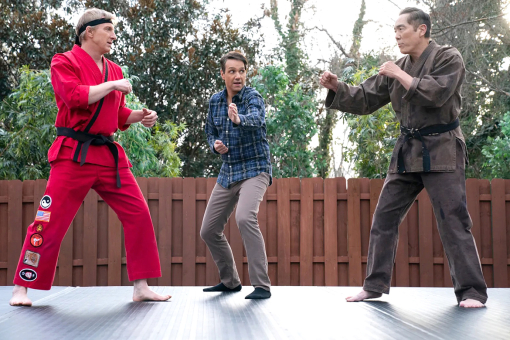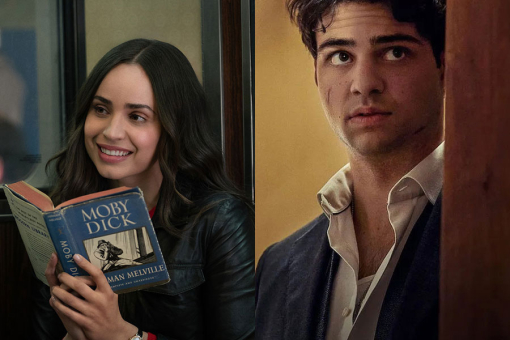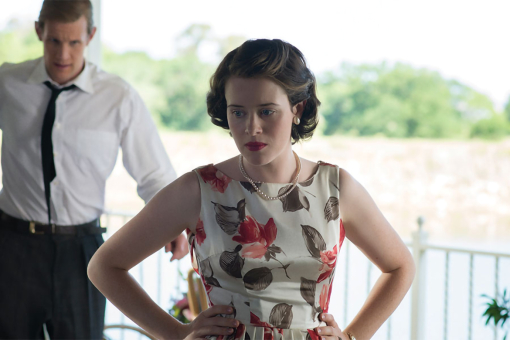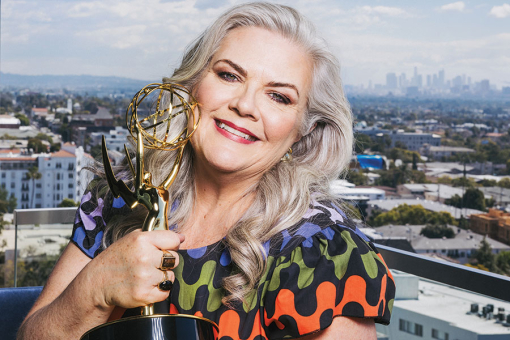It’s somewhat fitting that, during an interview with Paul Giamatti about his new Black Mirror episode, the Emmy-winning actor turns the tables on his interviewer. Twice.
It makes sense given the very probing, emotional subject matter of “Eulogy,” a critically acclaimed episode from the latest season of Netflix’s mind-bending anthology series. “Eulogy” centers on Philip (Giamatti), a New England recluse with a broken heart who is forced to revisit the source of that heartbreak via a virtual reality technology that allows him to literally step into old, analog photos. With help from an A.I. named The Guide (Patsy Ferran), Philip confronts his old New York co-op days as a 20-something, where he fell in love with music and a woman named Carol. His digital tour through his own nostalgia reopens old wounds and exposes Philip to a truth about his long lost love — one that challenges everything he knows about his role in the doomed relationship. This trip into his past lets him fall in love all over again with the person he has spent decades punishing for his station in life.
The audience is lockstep with Philip as he uncovers each new painfully rewarding truth about him and Carol. That aspect, and the practical way production approached filming the immersive photograph scenes, appealed to the John Adams star.
"I just got the script, and I said ‘yes’ to my agent immediately," Giamatti tells the Television Academy in an exclusive interview. "This just works. It's really cool. But do you think that it's actually a good thing, what this technology does for him? Would you want to do it?"
Find out the answer to that below, as well as Giamatti’s behind-the-scenes recollections of how the production pulled off the first photograph sequence and what the actor found refreshing about working with Black Mirror creator and "Eulogy" co-writer Charlie Brooker.
NOTE: Spoilers ahead.
Television Academy: The first time your character uses the tech allows him to "enter" an old photo of a rooftop party at his New York co-op. How was that achieved? It looks like it was shot practically.
Paul Giamatti: It’s all practical. That was the thing that I thought was so cool about it. I mean, they sweetened stuff with CGI — there's smoke coming out of [one] guy's bong, and you can see the backs of people's heads are all weirdly pixelated. But other than that, it was all practical.
So the background actors are all there, blocked in a way to not spoil the illusion of this seemingly 2-D photograph becoming an immersive, 3-D memory?
All of those people are actually standing there, and they were just frozen. Most of them were dancers or mimes. The actor playing my younger self and the woman he has a romance with were not. All of them were extraordinary at being expressive and frozen.
That initial scene took a really long time to do because it was something about the framing. It had to be so precise to get it to look kind of two-dimensional and then move. It just took forever, but it was worth it. It took forever to reset it to try to make it look "flat" for some reason. All of [the stepping-into-photograph scenes] were practical. [Digital effects] put the pen marks or the punched out [paper] things over her face. We could see her face in the actual scene while shooting, but that effect was added later. CG’d over her face.
We did try, I think, to have something else, but it wasn't really working. I think they had a thing with a bird that was supposed to be flying into the photo or was flying and frozen mid-air, something like that. But they got rid of it. But it was great. I mean, they were experimenting with it, and the two guys who directed it — Chris [Barrett] and Luke [Taylor] — were really terrific.
 ABOVE: The first photograph that Philip (Giamatti) revisits.
ABOVE: The first photograph that Philip (Giamatti) revisits.
What was your relationship like working with them, Charlie Brooker and his co-writer, Ella Road, especially in terms of keeping track of the complicated emotional storyline for your character?
It’s such a well-run operation, you know? It's nice coming to a thing like this that's so — everybody's on the same page. Everybody knows what they're doing. Everybody knows what the goal is. It's such a well-oiled machine in the best possible way. You're stepping into a thing that is just very complete.
Charlie is great. He is open to so many ideas and changes. It was funny — the script was [originally] written for British characters, and then they got me to do it. I had to go through and make sure it sounded American, because it didn't, and Charlie was completely open to whatever. He was like, "Whatever, just have fun. Make it fit for you and your character." And Luke and Chris, I think this is the first major thing that they had done, and they couldn’t have been better. They were so on point about the story. They were so smart about talking to the actors. They figured out how to talk and meet me and Patsy the right way. The whole thing just felt very fun.
I’m glad to hear how much fun it was to film, given how heavy the material is.
I mean, the sick thing for an actor is — that's fine. Sometimes, it’s fun to go into these dark places. I mean, not "fun," but you know what I mean? It's exciting. It's interesting, it gets you energized.
Your character is very much a recluse in his house on Cape Cod. He’s surrounded by dusty, analog things like a record player and his old records. How much input did you have on the set decoration and props?
That set was really amazing. One thing that was really fun was they were very concerned about getting it, the location, to look like Cape Cod. They had all these places, and they were like, "Does this look like Cape Cod? Does this look like Cape Cod?" And I was like, "That does. That looks like Cape Cod." And actually, it really did. They were very worried about that. The pier and the wharf [in the episode], they really wanted to make sure it looked like Cape Cod. And I was like, “Guys, it’s great. You're totally getting it right.”
[Philip’s] main room, I definitely talked about how there needed to be lots of albums and stuff, but they were doing all that.
Our perception of your character’s experience and his memory of this relationship begins one way, at the start of the episode, and it completely changes by the end. We think that he has been scorned, only to find out that’s not actually the case. And the audience is discovering the truth and having the same epiphany at the same time that he does. Did you go through what the audience did while reading the script, coming in fresh? Or did Charlie pitch the idea to you beforehand?
No, I just got the script, and I sat down and read it. And I said "yes" to my agent immediately. I mean, I'm a fan of the show, and I'm a fan of this kind of thing. But I'm a fan of the show particularly, and over the years, I had frequently said to my manager: "It'd be great if I could do something like Black Mirror." But I thought, "No, that’ll never happen." Then this [script] came, and I was really excited. I was like, "This just works. It's really cool." It was just a straight shot from beginning to end in a way that I really thought was terrific.
What I really admired about your performance is that, for all the emotional reveals your character careens through, you seem to give the exact amount of whatever the material needs to pull it off.
Oh, that's nice to hear, because I always worry that I do too much or too little. I'm always —
Really? But you’re an Academy Award nominee [laughs].
I'm always torturing myself about never hitting the sweet spot right. I'm always like, "I overdid it" or "I underdid it." So it's very nice of you to say. I guess maybe I'm not screwing it up as badly as I think, but that's good to hear. But if the writing is really good, like this, then you're not going to probably do that, I don't think. The writing guides you.
Speaking of writing, in your experience, have you found writers to be as similarly un-precious about their scripts as Charlie is?
It depends. I tend to think the really gifted guys — the really good guys — are open to it. They're surprisingly less precious about it. I mean, I work with [writer-director] Alexander Payne [Sideways and The Holdovers]. The [script] is so precisely written, but he's totally open. He has no ego about it. He's not like, "No, you can't touch my words." Then, eventually, he wants to get the script set. But I find that the really good writers are open to it — very much.
And I assume you had a say in who they cast to play the younger version of Philip?
Yes. Well, I assumed they were going to have to do something like de-age me. But they said, "No, we want to do everything practical and not do that." And I was like, "Good luck finding somebody that looked like me when I was 22!" So they brought two actors in, and one of them was Declan [Mason]. And Declan came in, and that was weird, because he looks like cousins of mine. Especially around the eyes. But, believe it or not, he really does look like me when I was 22. I was like, "They really found a guy who matched me pretty well." If you were to see pictures of me young, he's not bad. I thought it was really cool that they weren't going to de-age me. And I thought, "That's ballsy, and that's great." And it works for you? Do you buy it?
Oh, 100%. It’s very effective casting. That tactile approach —
That’s great. Yes, tactile. And, you know, Declan was terrific. So was Patsy; she’s unbelievably good in this. And so was the young woman who played Carol — they were so good at being expressive with their bodies frozen and their faces frozen. And that's hard. I mean, that's really hard to do. And it was great.
Is that extra challenging for you maybe in performing to people that can't move or emote in a scene when you can?
It was strange. It's great, too, because — the first time we went to a rehearsal place, Patsy and I, we went to a little space. [The filmmakers] just wanted us to see what it was like to walk around these frozen people, and all these people were there, and they froze. And both she and I were surprised at how eerie it was, and how creepy it was, at first. And it always was a little creepy and eerie to do it every time. Because these people were remarkable at it. They just didn't move. So it gave you a lot.
How much time did you get to rehearse shooting something this visually complex?
I think we probably had about a week or something, which is great.
That's very generous on a TV schedule.
Very generous. And that doesn't happen, not all the time. A lot of that time they needed to figure out how to shoot that stuff with those people frozen. It gave us time to get acquainted with [the technical aspect], and it was cool. We got to see some of the sets early, too, which was great. The Star Trek show I just did [Starfleet Academy], we had rehearsal time, but [Black Mirror] was more than you usually get.

How did you and Patty approach your characters and their relationship? The episode is basically a two-hander, almost like a play, between the two of you.
Because we had that rehearsal time, we sat around and we hung out. She's just a great person, and she’s a great, great, great actress. It was a tricky thing, though, with the tone. They did a lot of playing it in different ways, during takes, because they were still not sure how much they wanted her to seem like an A.I. or to seem like a real person. So she found all these different ways of doing it. It was fantastic to watch her do all these different things, and then they sort of mixed it up in a way that works beautifully. And she had to learn how to play the cello, which she was determined to do for real. And it was amazing. I couldn't do that, but she was terrific.
Now, the ending — it provides closure for your character, but it’s bittersweet. Because he seems to sense that maybe this relationship was more toxic than he realized. And how memory can be like a rust on how we live our lives in the present.
Maybe it was more toxic or less toxic. And in that moment — he finally can see [Carol]. But in seeing her, he knows then — that's it. Now, she is truly gone. But the interesting thing that I would ask you — and it was an interesting thing from first reading it to the end, to shooting that last funeral [scene], which was the last day of shooting — is: Do you think that it's actually a good thing, what this technology does for him? Would you want to do it?
A part of me would want to do it. But I'm a huge fan of ignorance being bliss.
Yeah. Yeah, I get that.
At the same time — if I'm living a false narrative, I would like to have the real catharsis that comes from it.
I suppose so.
What about you? Where did you come out on whether or not to use the tech, or if it would be helpful to use it or not?
I remembered the first time I read it, and I thought, "Oh, God, it's so grim what this guy goes through." It’s so interesting, too, how he's like, "I don't even want to do this" — but he does it anyway. It was like that sense of — we have no choice with this technology, but it's there. Like, our real technology that we have. We have to use it in our lives for certain things, so we just use it. But this tech [in the episode], there's something coercive about it. But then, when we actually did it, when we actually shot the scene, I felt like the catharsis for the guy was good. And then, when I saw it, it was more positive than I thought it was going to be. I'm ambivalent about it still. But I ended up more in a place of going, "Oh, maybe this was a good thing for the guy. Maybe it helped him." I don’t know.
This interview has been edited for length and clarity.
Black Mirror is streaming now on Netflix.











